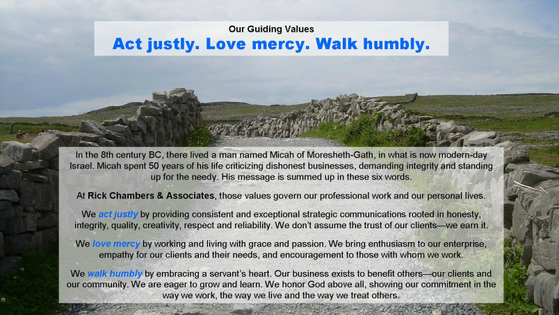
This reality struck me today as I listened to a speaker give an overview of her nonprofit employer. Plowing through her requisite Powerpoint deck, she reached the inevitable slide titled “Mission Statement.” Therein followed 47 words covering four distinct themes.
To get through it, she had to read the slide.
My own memory tends to be liquid, so I don’t blame the speaker for not knowing the words by heart. Still, if an organization’s mission can’t be easily internalized and clearly articulated, how can its employees understand and embrace it?
To clarify, I’m not picking on length. Long statements can guide and inspire just as short ones can make no sense. What matters is whether the mission statement accomplishes its task: defining what an organization is, what it does and why it matters. When done plainly and simply, it provides a clear direction and sense of purpose. Done poorly—too wordy or jargon-filled, too detailed (or too vague), too focused on marketing instead of guidance—and it’s a meaningless mishmash.
(Need proof? Check out this website, Mission Statement Generator, which assembles randomly selected jargon into empty, flaccid prose that read, rather disturbingly, like real-world mission statements. If you’re a masochist, keep hitting the “Generate” button.)
The work of a mission statement doesn’t stop with its crafting. I’ve seen organizations invest time and energy into creating mission statements only to leave them languishing on posters and the backs of business cards. Management assumes the employees “get” it and move on, with little insight offered on how to internalize and apply its tenets. Often, managers themselves don’t bother to use it.
When I began RC&A, I developed a mission statement—called guiding values, since the term “mission statement” brings certain baggage—that could be summarized in six words: Act justly. Love mercy. Walk humbly. The entirety of RC&A’s guiding values are crucial to our work; those six words simplify the values so they serve as a constant guiding star.
A mission statement should simply and clearly describe what an organization stands for. It should be as brief as possible and easy to remember—or at least lend itself to shorthand that people easily retain. It should both guide and inspire. And it should be rigorously applied to every facet of the organization’s work.
Or, you can simply state: “We will work in sync to professionally leverage others' high-payoff services while endeavoring to globally pursue multimedia based infrastructures.”
(Dang, that Mission Statement Generator is too much fun!)



 RSS Feed
RSS Feed
